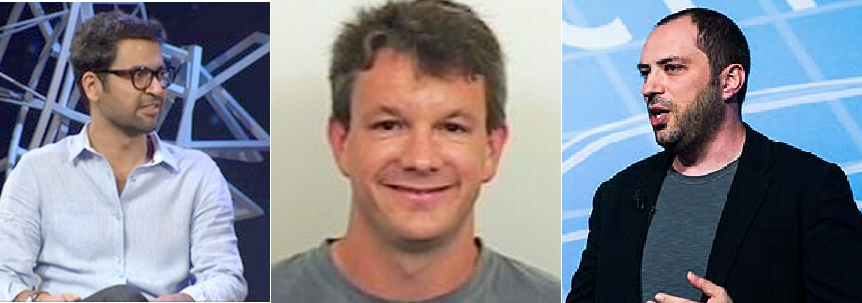
“Tech companies need to admit when they have done wrong,” wrote former WhatsApp chief business officer Neeraj Arora in a series of tweets, and a long post on LinkedIn, regrating the $22 billion sale of the company to Facebook.
“Nobody knew in the beginning that Facebook would become a Frankenstein monster that devoured user data and spat out dirty money. We didn’t either,” he expressed his remorse.
Facebook purchased messaging provider WhatsApp for a staggering $19.3 billion in 2014, in what has been dubbed the acquisition of the century. It was a transaction that dwarfed anything Apple, Microsoft, or Google had ever done.
Will you offer us a hand? Every gift, regardless of size, fuels our future.
Your critical contribution enables us to maintain our independence from shareholders or wealthy owners, allowing us to keep up reporting without bias. It means we can continue to make Jewish Business News available to everyone.
You can support us for as little as $1 via PayPal at office@jewishbusinessnews.com.
Thank you.
Actually, informal discussions between the two corporations began nearly two years prior to the historic transaction. WhatsApp was bought by the internet titan after much back and forth multiple rounds of talks, and opposition from privacy groups.
However, in 2014, Facebook approached Arora and his team with what appeared to be a partnership-type offer.

According to Arora, who assisted in the negotiation, the founders Jan Koum, and Brian Acton have made three major criteria concerning the service’s future – in Brian’s handwriting: ‘No Ads, No Games, and No Gimmicks’. Arora added that the WhatsApp business plan was to charge a $1 yearly subscription for unlimited usage. Those requests were accepted. Facebook agreed to a board seat for Jan Koum and an office in Mountain View. Facebook also pledged to implement end-to-end encryption. “Today, I regret it,” Arora emphasized.
Co-founder Brain Acton departed WhatsApp in 2017 due to deteriorating relations with Zuckerberg. Arora quit WhatsApp with Jan Koum in 2018. This was the time the Cambridge Analytica controversy erupted. Arora mentions Brian Acton’s tweet “Delete Facebook” on March 20, 2018.
It is time. #deletefacebook
— Brian Acton (@brianacton) March 20, 2018
In his post, Arora stated “If you used WhatsApp in the early days, you remember what made the product special:
“International communication.
For people (like myself) with family in multiple countries, WhatsApp was a way to stay connected—without paying long-distance SMS or calling fees.
How WhatsApp made money was by charging users $1 to download the app.
And Facebook (said they) supported our mission & vision.”
Things began to look extremely different in 2017 and 2018.
He continued by stating that he is not alone in regretting WhatsApp’s acquisition. “In order for Silicon Valley to evolve, we need to talk about how perverse business models cause well-intentioned products, services, and ideas to go wrong. And where we go from here,” Arora said while concluding his post on LinkedIn.
WhatsApp is, according to Arora, Facebook’s second-largest platform. However, it is only a semblance of the product he and his team put their souls into and desired to produce for the world.”
Here is Arora’s full post:
In 2014, I was the Chief Business Officer of WhatsApp.
And I helped negotiate the $22 billion sale to Facebook.
Today, I regret it.
Here’s where things went wrong:
WhatsApp was founded 5 years earlier (2009) by Brian Acton and Jan Koum.
2 years in (2011), I joined the team as Chief Business Officer.
And in 2012/13, we were approached by Zuck & Facebook about an acquisition.
We declined and decided to keep growing instead.
But then…
FB approached us again early 2014 with an offer that made it look like a partnership:
• Full support for end-to-end encryption
• No ads (ever)
• Complete independence on product decisions
• Board seat for Jan Koum
• Our own office in MV
• Etc.Best-case scenario.
If you used WhatsApp in early days, you remember what made the product special:
International communication.
For people (like myself) with family in multiple countries, WhatsApp was a way to stay connected—without paying long-distance SMS or calling fees.
How WhatsApp made money was by charging users $1 to download the app.
And Facebook (said they) supported our mission & vision.
Brian even wrote this famous note: No Ads, No Games, No Gimmicks.
As we began talking through the acquisition, and made our stance very clear:
– No mining user data
– No ads (ever)
– No cross-platform trackingFB and their management agreed and we thought they believed in our mission.
Of course, that’s not what happened.
In 2014, WhatsApp was acquired by Facebook for $22 billion (in cash & stock).
But by 2017 and 2018, things started to look very different…
Until eventually, in 2018, right as details of the Facebook/Cambridge Analytica scandal came out, Brian Acton sent a tweet that sent shockwaves through the social media stratosphere.
Today, WhatsApp is Facebook’s second largest platform (even bigger than Instagram or FB Messenger).
But it’s a shadow of the product we poured our hearts into, and wanted to build for the world.
And I am not the only one who regrets that it became part of Facebook when it did.
Tech companies need to admit when they have done wrong.
Nobody knew in the beginning that Facebook would become a Frankenstein monster that devoured user data and spat out dirty money.
We didn’t either.
In order for Silicon Valley to evolve, we need to talk about how perverse business models cause well-intentioned products, services, and ideas to go wrong.
And where we go from here.



